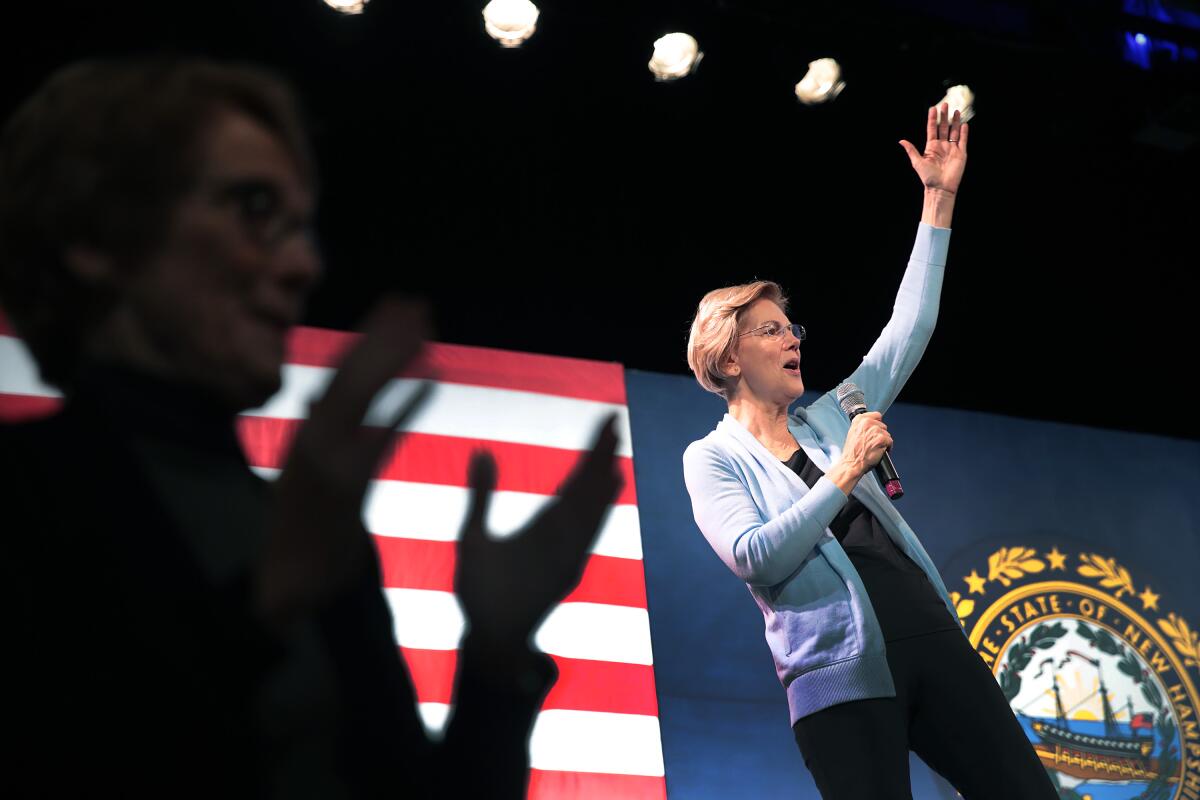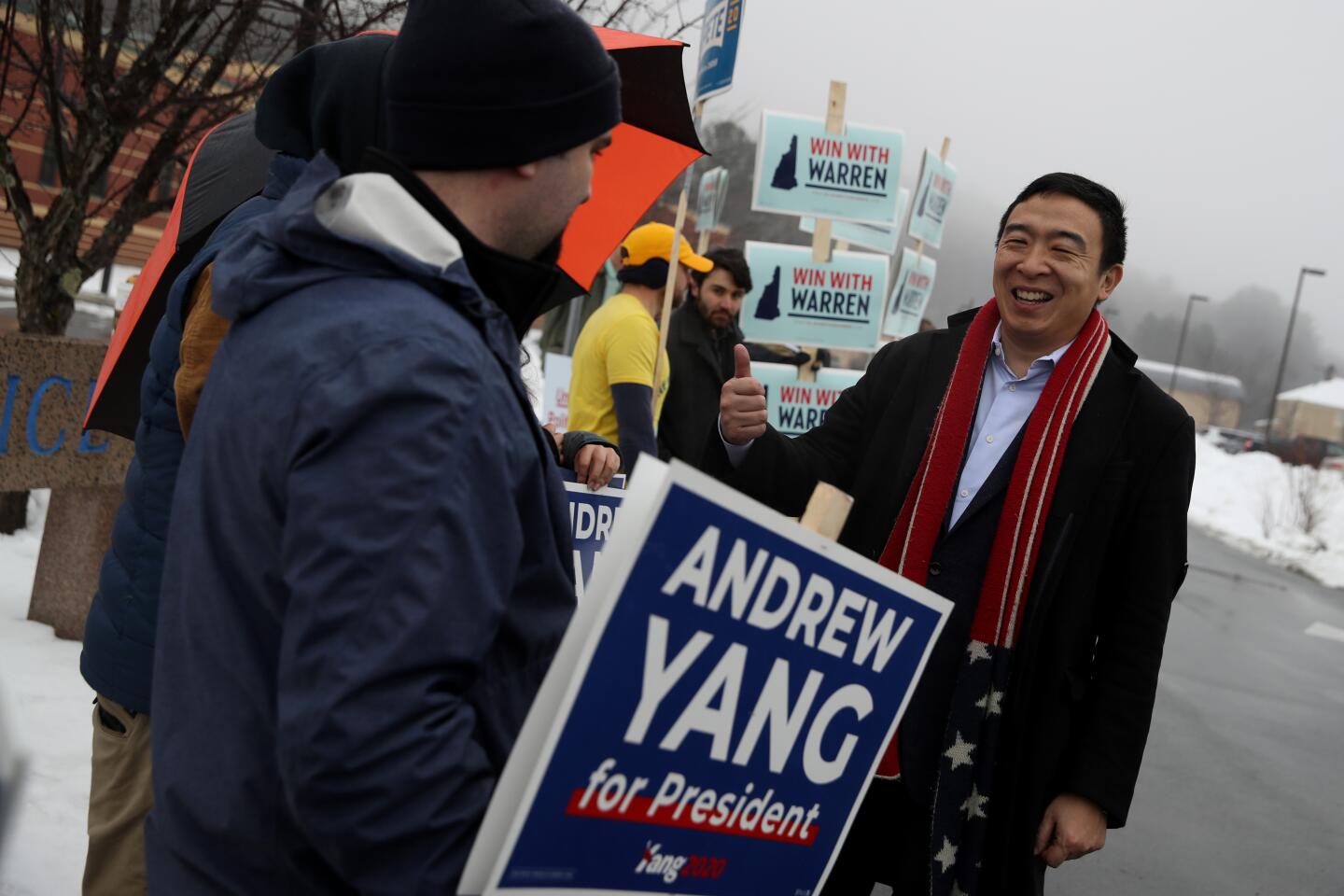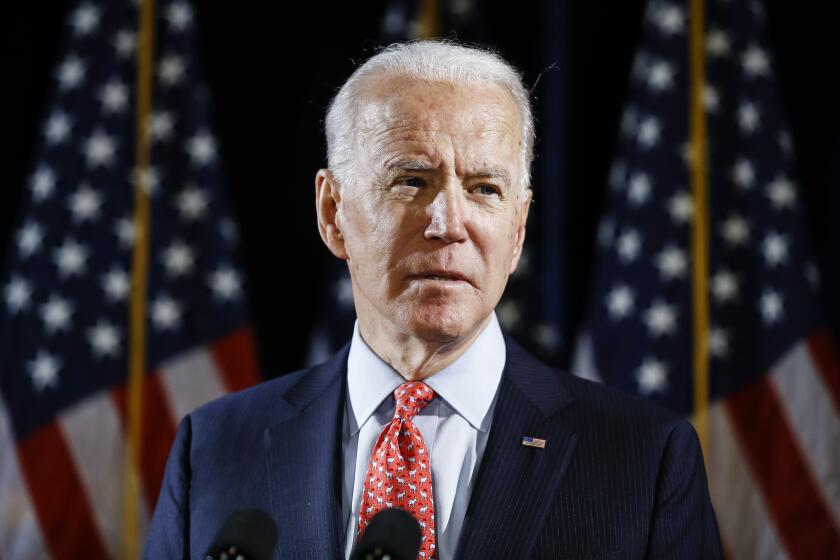Is New Hampshire Elizabeth Warren’s last stand?

- Share via
CONCORD, N.H. — It was not supposed to be this way for Elizabeth Warren, slogging through the snow and bitter cold as she struggles to salvage her once-soaring campaign.
She had policy plans — tons of them — a strong political operation that had her atop polls, and the advantage of hailing from New Hampshire’s next-door neighbor, where the U.S. senator from Massachusetts won two statewide campaigns.
She was known and well liked among Democrats in New Hampshire, where many commute south to jobs across the state line, get their news from Boston media and voters historically prefer presidential candidates who are their New England kin.
Then came last week’s third-place Iowa finish, punctuating what has been a steady fall. Now, instead of a victory lap, Warren’s New Hampshire campaign has the feel of a last stand.
Failing to win Tuesday’s primary, or at least finish strongly, could effectively end her campaign before February even reaches its midway point, though Warren insisted she would go on. “I’m in it for the long haul,” she told reporters who have asked repeatedly in recent days about her road ahead. “I built a campaign to be in it for the long haul.”
In political campaigns, having to insist that hope is not lost is never a good sign.
The rich, brainy city of Cambridge, Mass., reflects Elizabeth Warren’s have-a-plan approach as well as inequality issues at the center of her campaign.
Warren’s dilemma has been evident for months, but gained sharp relief in Iowa’s aftermath: She is being squeezed from two sides.
On her left is Bernie Sanders, who enjoys his own built-in advantage as the senator from neighboring Vermont. (He won New Hampshire in 2016 in a landslide with 61% support, though no one expects Sanders to match that performance in this year’s crowded field.)
Like Warren, Sanders has campaigned as a scourge of corporate America and called for higher taxes on the country’s wealthy to pay for expanded healthcare, increased education funding and other social benefits.
Early in the campaign, Warren signed on to Sanders’ proposal for a government-managed healthcare system, “Medicare for all,” and then — when questioned about the cost — backed off and proposed a go-slower approach. That alienated many on the left and raised questions about her consistency as well as authenticity.
Bernie Sanders won the New Hampshire primary Tuesday night, with Pete Buttigieg not far behind and an unexpectedly strong Amy Klobuchar in third. Follow analysis from Los Angeles Times journalists in New Hampshire.
Justin Connell, who came to hear Warren speak at a Concord, N.H., middle school after happening upon her rally during a Sunday stroll, said she was his second choice behind Sanders, in part because Vermont’s senator has never strayed from his core message.
“He sticks to his guns,” said the 44-year-old high school science teacher, who voted for Sanders the last time over Hillary Clinton.
Positioned to the right of Warren are former South Bend, Ind., Mayor Pete Buttigieg, former Vice President Joe Biden and Sen. Amy Klobuchar of Minnesota, among others, all with potentially more appeal to independents, who make up nearly half the New Hampshire electorate and can vote in the Democratic primary.

“They dislike the president and wish for someone else,” said Dante Scala, an expert on state politics at the University of New Hampshire. “On the other hand, they’re comfortable in their personal lives and they’re enjoying good fortune. They’re a little skeptical about rocking the boat too hard in their choice in a Democrat.”
There is doubtless an element of sexism working against Warren, as there is for any woman seeking public office. Some, while lamenting that fact, have nevertheless been hesitant to support her out of concern that gender might undermine her chances to defeat President Trump.
Maureen McNulty, 56, a small-animal veterinarian from Lebanon, N.H., came to hear Sanders speak at a town hall in nearby Hanover as she weighed a choice between Buttigieg, Sanders, Warren and businessman Andrew Yang. McNulty said she was looking for the candidate who could best return “morality back to government” after what she sees as the corruption of the Trump administration.
“I lean toward Elizabeth Warren,” McNulty said, but worries that “what would be considered forthright in a man is ‘pushy’ in a woman.”
‘I’m in it for the long haul. I built a campaign to be in it for the long haul.’
— Elizabeth Warren
Whatever her fate, Warren has campaigned across New Hampshire in the last days of the primary contest with unremitting zeal. Unlike Biden, Buttigieg and Sanders, she has not attacked her opponents, or even mentioned them by name in her remarks, calling instead for the party unity that seems more elusive by the day.
She outlined her proposals to soak the rich, build more affordable housing, rein in Washington corruption, expand opportunity for disabled Americans, make prescription drugs more affordable — pause, gulp for air — forgive student loan debt, strengthen the Affordable Care Act and more.
“We want to beat back the influence of money in Washington. It’s going to take big structural change. Who’s up for that?” she asked, to affirmative whoops and cheers from a crowd of several hundred filling a performing arts center in Derry.
“I’ve got a plan for that!” she hollered, to more whoops and cheers as she let loose her signature campaign line.
Warren called out for questions, then engaged audience members with the hyper-enthusiasm of the teacher of grade-school children that she used to be.
“Hi, Amelia!” she exclaimed, great question! “Hi, Kate!” she burst out, so glad you asked that!
From the front row, Jesse Dodge took it in eagerly.
“She’s got the right stuff,” said the 44-year-old independent from Massachusetts, one of many who came from Warren’s home state to cheer and buoy her candidacy. “She can beat Trump. She’s got the right ideas. It’s the right time.”
But even Dodge said Warren “has got to do better than she’s doing right now in the polls,” which — if they are believed — show Warren far behind the leaders in New Hampshire.
The field is down to Joe Biden now that Bernie Sanders ended his presidential campaign. Here is the Democrat heading for a battle with President Trump.
The senator has seldom varied from her standard campaign speech, delivered word for word countless times, with the same dramatic pauses and jokey asides. In recent days, though, she introduced a notably different note.
“I was thinking about unwinnable fights, because I think they tell us a lot about who we are,” she told a crowd of several hundred gathered in a high school gymnasium in Lebanon, near the Vermont border.
Throughout her life, Warren told them, she has faced adversity, from losing her teaching job when she became pregnant to facing personal ridicule in her first Senate run in 2012 against Republican incumbent Scott Brown.
“Every time I got knocked down,” she said, “I got back up.”
On Tuesday, Warren will have to prove herself again. If she can’t win in her own backyard, it is difficult to see where else she can.
Times staff writer David Lauter in New Hampshire contributed to this report.
More to Read
Get the L.A. Times Politics newsletter
Deeply reported insights into legislation, politics and policy from Sacramento, Washington and beyond. In your inbox three times per week.
You may occasionally receive promotional content from the Los Angeles Times.
















